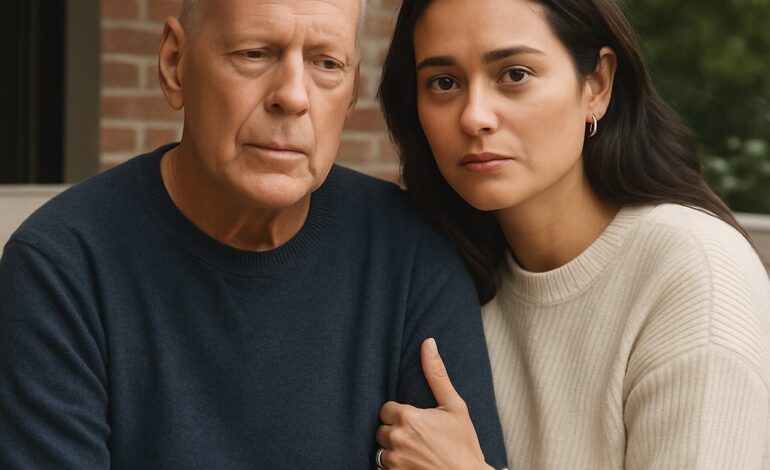Emma Heming Willis pushes back at critics after revealing Bruce lives in separate dementia care home

I am Sage Matthews, and Emma Heming Willis just told the internet’s loudest spectators to sit this one out after revealing Bruce Willis now lives in a separate, specially designed home built for his frontotemporal dementia care. Another day, another reason to reconsider society, where someone shares a painful, carefully considered family decision and the comments section decides it is time to play judge and jury.
Here is the tea, laced with cold reality. In an ABC News special with Diane Sawyer titled Emma and Bruce Willis: The Unexpected Journey, Emma explained that Bruce was moved into a nearby residence tailored to his needs so a professional care team can support him around the clock. She called the move one of the hardest choices she has had to make, stressing that the priority was safety, stability, and preserving something resembling a normal home life for their daughters. Cue the social media uproar, because of course. Some viewers decided space equals abandonment, and that nuance must be a conspiracy.
Emma did not let that ride. In a video posted to Instagram on Friday, Aug. 29, she addressed the backlash head on. “The truth is that the opinions are so loud and they’re so noisy,” she said, sounding like someone who just opened her DMs and needed a deep breath. Then she drew a line: “If they don’t have the experience of this, they don’t get a say, and they definitely don’t get a vote.” It is the kind of sentence that lands because it is earned, not because it is convenient.
She went further, pointing out that sharing their story was never about courting sympathy. It was about clarity and community. “I think that they did a beautiful job with amplifying FTD awareness,” Emma said of the ABC special. She predicted the reaction would split into two camps, “people with an opinion versus people with an actual experience.” Translation for the cheap seats: caregiving is complicated, and internet hot takes rarely are.
In her caption, Emma said what many caregivers think but rarely say out loud. “Too often, caregivers are judged quickly and unfairly by those who haven’t lived this journey or stood on the front lines of it.” She added that sharing openly may invite opinions, sure, but it also creates connection and validation for the people actually navigating this every day. That is the audience she is speaking to, and that is the community she is building. File this under why public honesty is both brutal and necessary.
Let us not pretend the setup is cold or distant. During the ABC sit-down, Emma emphasized that she and their daughters, Mabel, 13, and Evelyn, 11, visit often. “We’re there a lot,” she said. “It’s our second home, so the girls have their things there.” She painted a picture of a space that is not clinical but lived in. “It is a house that is filled with love and warmth and care and laughter.” And yes, even in the darkest chapters, that matters.
Context for the chronically online: Bruce Willis’ frontotemporal dementia diagnosis was made public by his family in 2023, a development widely covered by outlets like ABC News and People Magazine. FTD alters behavior, language, and decision-making, and it can put families in impossible positions where every choice is a tradeoff. So the separate home is not a plot twist. It is a care plan. The kind professionals recommend, the kind many families cannot access, and the kind that still hurts to implement even when you can.
Back to the critics. Emma’s message is not subtle. If you have not handled medications at 3 a.m., navigated wandering risks, or juggled the mental gymnastics of keeping kids’ lives intact while also meeting a patient’s evolving needs, maybe do not rush to declare what real love looks like. That is the subtext behind “they do not get a vote,” and it feels less like a clapback and more like a boundary backed by experience.
From a media standpoint, the corroboration is all there. The ABC special laid out the reasoning behind the separate residence, and Emma’s Instagram post nailed the point home with timestamped clarity. The public diagnosis in 2023 is on the record, and her description of the current arrangement matches what dementia care specialists often advise. There is no scandal in the facts, just the uncomfortable truth that caregiving is messy and public judgment is easy.
So where does that leave us? With a family doing the best they can under a diagnosis that rewrites the rules, and an audience being asked to sit in discomfort without defaulting to outrage. Watch for whether the noise cools off or recharges the next time Emma shares an update. Because if history is any guide, empathy has a shorter shelf life than a trending topic, and comment sections love a pile-on more than they love perspective. At this point, should we even pretend to be surprised?
Sources: Celebrity Storm and New York Post, ABC News, Instagram, People Magazine
Generated by AI




